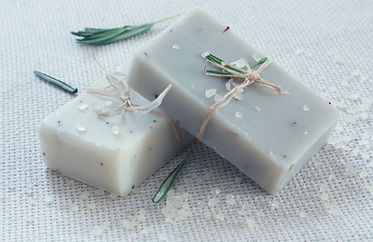
TOILETRIES
Synthetic chemicals commonly used in cosmetics are polluting both the environment and our bodies. We wash large quantities down the drain every day which can then come back to haunt us in our water supply and accumulate in our seas and rivers.
- Women's Environmental Network
On average 93% British women use cosmetics and toiletries, making us one of the highest users in Europe. Not only does this mean we are using a huge amount of unnecessary packaging, we are exposing ourselves and the environment to damaging chemicals. The Women's Environmental Network has found that around 57% of products contain a preservative that imitates oestrogen, which is especially concerning as lifetime exposure of increased oestrogen levels have been linked to serious health conditions.
All this just to smell and look that bit more appealing?
I'm not necessarily saying that your favourite perfume or shampoo is going to make you ill, but we should be assured that what we are using is safe for ourselves, other sentient beings and the planet.
The Ugly Truth

ECO TOILETRY ME with these tips below!
1. Less is more
Try going for that one day without makeup or that next day without washing your hair. It can be hard when you're set in a routine but you don't necessarily need to lather yourself in all these chemicals just to smell good for another couple of hours. Plus, I'm sure you look lovely without all that slap!

2. Package free please

So many of our daily washing products are in plastic bottles or wrapped in unnecessary packaging. Not only are these difficult to recycle, some plastics leak toxins into the environment which can be incredibly damaging. Try switching to package-free products such as shampoo, conditioner and soap bars which can be found at stores such as LUSH who aim to remove as much packaging as possible. More Toiletries expands more on LUSH's good deeds and how you can move along to be more package-free!
3. Be picky

If you're buying a product with packaging, try and only invest in glass or paper so these can be reused and recycled. If plastic really is the only option, avoid PVC plastic which can be identified by a recycling triangle with the number 3 in it. Producing this material releases harmful dioxins into the environment and often ends up in landfill sites. Only buy plastic packaging with the recycling triangle including a 1, 2, 4 or 5 in it.
4. Natural vs chemical

This relates back to products from our Plastic section such as synthetic microbeads which are toxic to the environment and can be damaging to your skin. Other chemicals found in our washing products such as sulphates and parabens can also irritate and dry out the skin. Try something natural and cheaper instead such as oats or ground coffee which can be easily be made into a paste and will leave you feeling refreshed and chemical-free! Check out More Toiletries to find out more.
5. Avoid animal testing



This does not directly relate into sustainability but is more about the importance of animal welfare. Animals shouldn't be exploited for us to look more attractive or make us smell nicer. You can identify what companies are animal testing free by looking for certain symbols on toiletry packaging such as the leaping bunny. Find a list of what companies you should invest in who do not believe in animal testing on the More Toiletries page.
6. Palm oil problems

Almost all cosmetics, toiletries and even food contains palm oil. It's incredibly difficult to avoid. However you can invest in companies that make an extra effort to not use palm oil or at least farm it sustainably. Check out the Palm Oil page to find out more about why palm oil is such a huge problem and how you can do your bit to be more sustainable.
